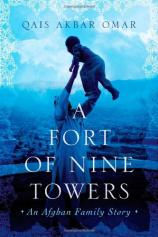Reading Group Guide
Discussion Questions
A Fort of Nine Towers: An Afghan Family Story

1. How did Qais Akbar Omar’s portrait of his homeland change your understanding of Afghanistan and the presence of American troops there?
2. How did the author’s descriptions of Kabul compare to your previous assumptions?
3. What does hospitality mean to Afghans? What does it mean to you?
4. On pages 121–122, Omar’s cousin Wakeel offers a poignant description of what makes Omar’s father an ideal parent. How does Omar himself characterize his mother and his father? How do his perceptions of them shape his experiences?
5. How is the author’s relationship with his parents similar to or different from the relationships between parents and children in the West? What about the relationship between the author and his grandfather?
6. Omar’s grandfather was a deeply moral man whose ability to see peace and wisdom in all things allowed him to flourish. Which of Grandfather’s lessons will remain with you?
7. In chapter 11, “My Teacher,” Omar is awakened to carpet-making as an art form and a cultural legacy, and he receives lessons in business as well. What is his teacher able to communicate to him that no one had shown him before?
8. Born in 1982, Omar has already experienced many lifetimes of loss and restoration. What do his memories tell us about spiritual and emotional abundance in the face of destruction? What marked his transformation from boyhood to adulthood?
9. How do the responsibilities of a sixteen-year-old Afghan boy compare to those of his Western counterpart?
10. Discuss the women we meet in A FORT OF NINE TOWERS . How do Omar’s mother and sisters compare to the images of Afghan women you have seen in the media? How do they compare to American women?
11. More than once, Omar and his loved ones are saved by individuals who appreciate the lineage or reputation of their family. What else contributes to their survival? What separates survivors from those who perish? Fate alone? Can you imagine how you might fare under similar circumstances?
12. In chapter 6, “Under the Earth,” Omar and his father are saved by a young Hazara who goes by the name Berar (Brother), who kills a brutal commander and apologizes for the suffering he caused. Earlier, when Omar and his grandfather are spared by a Hazara commander who turns out to be a former student of Omar’s father, that commander justifies the horrors unleashed by his people: “We Hazaras have been treated like slaves in this country” (page 86). He goes on to describe the ways in which the Pashtun warlord Gulbuddin Hekmatyar and the Panjshiri warlord Masoud have harmed his loved ones. Ultimately, where is the line between a quest for vengeance and a thirst for violence? Is there a line between them? Is it possible to keep retaliation from escalating?
13. Discuss Omar’s deepening understanding of Islam. How does his faith evolve?
14. When Omar’s family adapts to Kuchi (nomad) ways in chapter 12, “Caravan,” what rewards do they discover in living off the natural world?
15. How did Omar’s story enhance your understanding of the Taliban’s rise to power? Discuss your reactions to the decrees outlined in chapter 17, “A New Kind of Justice.”
16. How is Omar affected by the chemistry teacher’s experience captured in chapter 19, “A Precious Jewel”? What does she teach him about the best and worst of human nature?
17. On page 367, Omar’s father explains his abrupt decision to stay in Afghanistan after the American invasion: “We have a long tradition of raiding and plundering each other. But two things unite us: love for Allah, and hatred for our invaders and enemies.” This statement echoes Omar’s words in the prologue, as he contemplates how to explain to his aunt, who lives in Canada, that he wants to stay in Afghanistan. Do you feel a similar connection to your homeland? Would you be able to stay, regardless of the danger?
18. What do you make of the difference between the Afghan custom for many generations of a family to live together and the Western tendency for adults to live independently?
19. How much or in what way has A FORT OF NINE TOWERS changed your perception of Afghanistan and of Afghans?
A Fort of Nine Towers: An Afghan Family Story
- Publication Date: April 16, 2013
- Hardcover: 416 pages
- Publisher: Farrar, Straus and Giroux
- ISBN-10: 0374157642
- ISBN-13: 9780374157647







